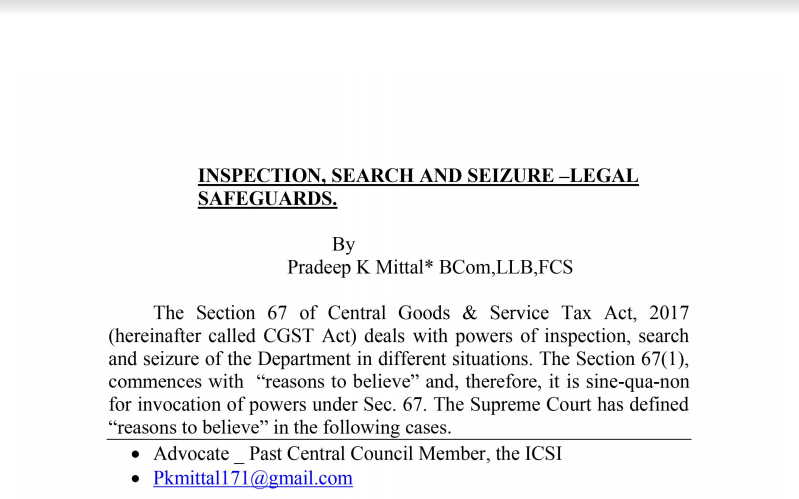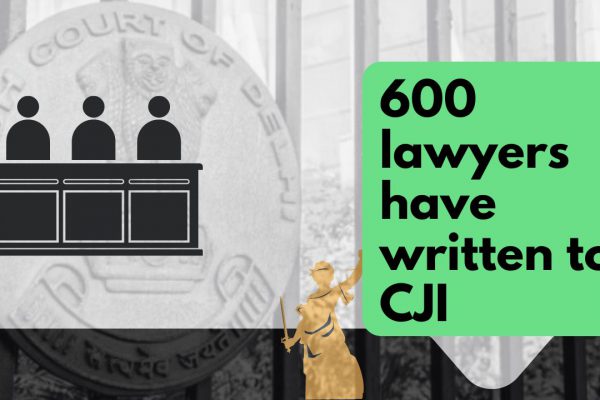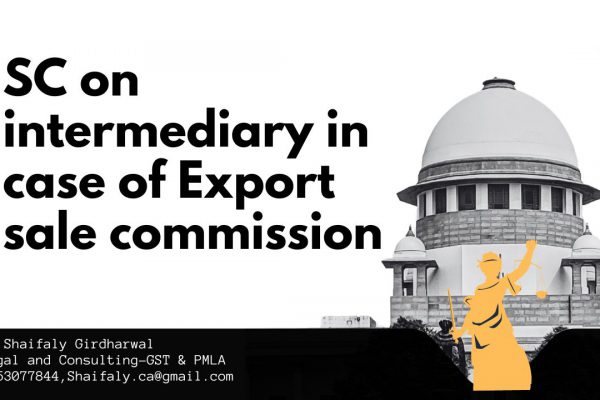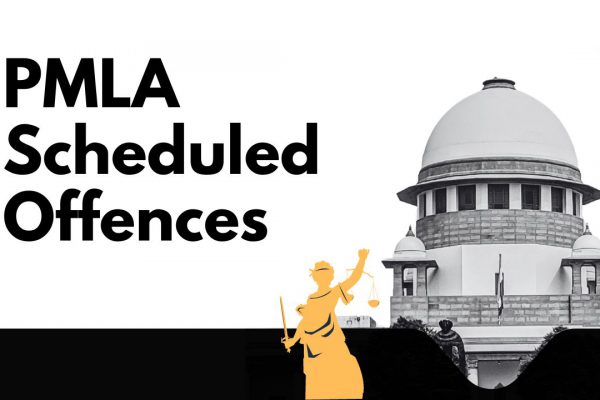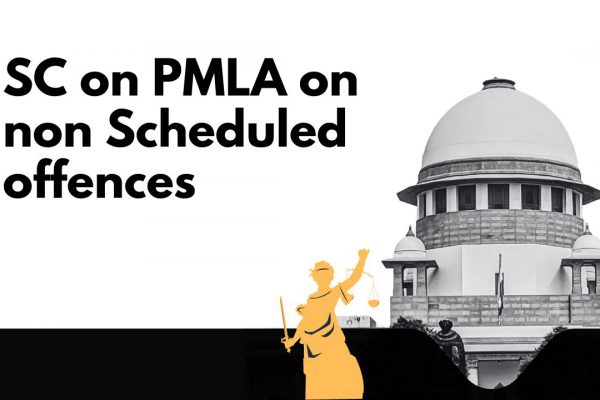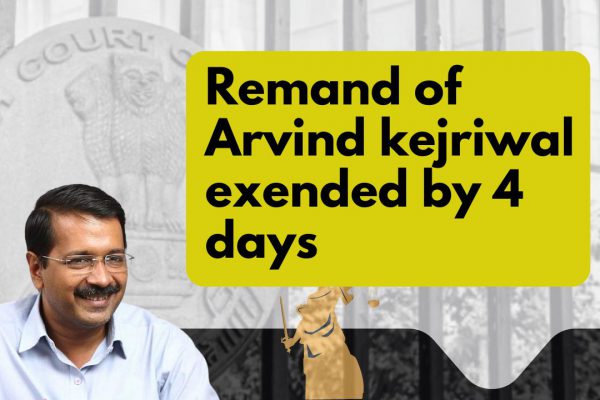Inspection, Search and Seizure- Legal Safeguards
Inspection, Search and Seizure- Legal Safeguards
I have written an Article on Section 67 CGST Act on the issue of ” Inspection, Search and Seizure ” it’s meaning, scope, and jurisdiction. It also deals with various safeguards that are available to assessee with the help of decided cases of Hon’ble Supreme Court and various High Courts both under pre-GST and post GST regime.
Section 67 of Central Goods & Service Tax Act, 2017 (hereinafter called the CGST Act) deals with powers of inspection, search, and seizure of the Department in different situations. Section 67(1), commences with “reasons to believe” and, therefore, it is sine–qua–non for invocation of powers under Sec. 67. The Supreme Court has defined “reasons to believe” in the following cases.
2: In Pratap Singh V. Director of Enforcement, MANU/SC/0202/1985, Apex Court has held that “the expression ‘reason to believe‘ is not synonymous with the subjective satisfaction of the officer, the belief must be held in good faith, it cannot be merely a pretense – belief is not extraneous or irrelevant for the purpose of the section.
3: The words ‘reason to believe‘ has been interpreted by the Supreme Court in N. Nagendra Rao and Company Vs. The state of AP, MANU/SC/0530/1994, – though the formation of opinion may be “subjective” it must be based on material on the record and cannot be arbitrary, capricious, or whimsical.
4: The Supreme Court in Ganga Saran & Sons (P) Ltd Vs. ITO MANU/SC/0297/1981 has interpreted the words “has reason to believe” to be entertained by the ITO must not be arbitrary or irrational. It must be reasonable or in other words, it must be based on reasons which are relevant and material.
5: Under Sec.67(1), the formation of “reasons to believe” must be on the part of an officer not below the rank of Joint Commissioner and not that of a person who has ultimately been authorized. The power can be exercised if there is:
a) suppression of supply of goods or services;
b) Concealment of stock of goods;
c) Excessive availment of ITC;
d) Contravention of any provision Act or rules made for the purpose of evasion of Tax.
by a taxable person;
5.1: (a): any person engaged in transporting goods;
(b): owner or operator of godown or warehouse or any other place used for keeping goods which escaped tax;
(c): kept his accounts, goods in such a manner as is likely to cause evasion of tax payable by any person under this Act. This will cover even on “non–taxable person”.
6: In other words, either any officer not below the rank of Joint Commissioner or any officer so authorized by aforesaid, may inspect (i) any place of business of taxable person; (ii) person engaged in transporting goods or (iii) owner or operator of warehouse or godown or any other place – even if such person is a taxable person or not.
7: As per Section 67(2) of CGST Act, PO not below the rank of Joint Commissioner in terms of inspection carried out under sub–section (1) above or otherwise has “reasons to believe” that any
(a) Goods are liable to confiscation;
(b) Documents, books or things, which in his opinion, shall be
Useful for or relevant to any proceedings under this, are secreted in any place either he himself or may authorize any other officer of central tax to search and seize such goods, documents, or books or things. The seizure could be of (i) goods (ii) documents – be in the soft form or hard form, files, registers, papers, statements; (iii) books of accounts, ledger, journals, vouchers, (iv) things – it could cover all ancillary, incidental articles, things, objects, computers;
8: The first proviso to Sec.67(2) provides that if it is not practicable to seize any goods, the PO or any person authorized by him, shall serve a notice upon the owners or custodian of goods calling upon to him (a) not to remove (b) not to part with (c) or otherwise not to deal with the goods except previous permission of such person. Sub–Section (5) of Sec. 67 permits taking photocopies or extract thereof unless as per the Department, it does not adversely affect the investigation.
Pre-Condition For Exercise of Powers Under Sec. 67.
9: The Supreme Court in Durga Prasad v. Supdt. C. Ex. MANU/SC/0101/1965 held that the power of search granted under Section 105 of the Customs Act (pari–materia to section 67 (2) of the Act, 2017) is a power of general search but it is essential that before this power is exercised, the officer concerned must have reasons to believe that the documents and things which in his opinion are relevant for any proceedings under the Act are secreted in their place.
10: The DB of Gujarat High Court in Golden Cotton Industries vs. Union of India (19.06.2019 – GUJHC): MANU/GJ/1825/2019 observed as under:
The statutory requirement of reasonable belief, rooted in the information in possession of Proper Officer under the Act, is to safeguard the citizen from vexatious proceedings. “Belief” is a mental operation of accepting a fact as true, so, without any fact, no belief can be formed. It is true that it is not necessary for the Proper Officer under the Act to state reasons for his belief. But if it is challenged that he had no reason to believe, in that case, he must disclose the materials upon which his belief was formed.
11: The DB of Gauhati High Court in Md. Tajal Hussain vs. State of Assam (25.11.2019 – GUHC): MANU/GH/0990/2019, before carrying out “search & seizure” opinion by the Proper Officer must be recorded in writing and further in relation to the scope of Section 67(1) & (2), has observed as under:
A reading of Section 67(1) shows that where the proper officer not below the rank of Joint Commissioner has reasons to believe that there is any violation or evasion of tax under the GST Acts, he may authorize in writing any other officer of the department to inspect any of the places of business of the taxable person. Under Section 67(2) where the proper officer either pursuant to an inspection carried out under Section 67(1) or otherwise has reasons to believe that any goods liable to confiscation or any documents or books or things, which in his opinion shall be useful for or relevant to any proceedings under the Acts, are secreted in any place, he may authorize in writing any other officer to search and seize such goods, documents, books or things. Provisions of Section 67 of the AGST Act contains a clear provision that prior to any inspection, or as a matter prior to any search and seizure, a recording of reasons by the proper officer for such belief is a requirement of the law and only thereupon the process for search, seizure or confiscation can be undertaken.
Section 67(2) – Seizure of Goods:
12: The Supreme Court in Gian Chand V. State of Punjab MANU/SC/0366/1961 has observed that “while every detention does not amount to seizure, but every seizure automatically encompasses detention.
13: The DB of Punjab & Haryana High Court, while interpreting Section 105 of Customs Act (which is almost on similar lines of Section 67(2) of the CGST Act, in the case of Vishnu Processors vs. Union of India and Ors. : MANU/PH/0453/2020, has held as under:
The section is widely worded and search can be conducted if the Assistant or Deputy Commissioner of Customs has reasons to believe that there are any documents or things which in his opinion will be useful or relevant to any proceedings under this Act or secreted at any place. The section does not restrict the search only with regard to importer or exporter, the other premises can also be searched. The petitioner was a supplier/seller to the exporters at Ludhiana, there was an investigation that ineligible drawback, etc. had been claimed by procuring only the bills without there being the transfer of goods, this establishes the relevance of search with proceedings under the Act.
14: The Madras High Court in ALM Enterprises Vs. Comm. MANU/TN/0357/2017, while interpreting Section 124 of Customs Act (almost similar to Section 67(7) of CGST Act) has observed as under:
The above provision makes it clear that if no notice under Section 124 of the Act is issued within six months of the seizure of the goods, the goods shall be returned to the person from whose possession they were thus seized. The computation of six months period is thus to commence, obviously, only from the date the goods are seized by the Proper Officer under sub–section (1) of Section 110; but not from the date of their detention as urged.
15: Section 67(4) further permit the authorized officer to seal or break open the door of any premises or to break open any almirah, electronic device, box, the receptacle in which any goods, accounts, registers or documents of the person are suspected to be concealed, where access to such premises, almirah, electronic device, box or receptacle is denied. Under Section 67(5) permits taking copies of documents seized except where taking photocopies prejudicially affect the investigation. It is a mystery as to how giving photocopies to persons will affect the investigation.
16: Section 67(6) permits the release of goods so seized under subsection (2) upon execution of bond and furnishing of bank guarantee or upon payment of tax, penalty, and interest. Further, if no notice is given within a period of six months (liable to be extended for another six months upon sufficient grounds being shown) from the date of seizure of goods as per sub–section (2), the said goods shall be liable to be released to the person. It is very strange and extremely unusual that department is taking six months extendable to one year for mere issuance of a notice = but for adjudication of SCN for a normal period, it is three months and for an extended period of limitation, it is six month – which I cay say, from my experience at the bar, is virtually impossible to adjudicate unless justice is sacrificed by gross violation of the principle of natural justice.
17: The DB of Gujarat High Court in Paresh Nathalal Chauhan vs. State of Gujarat (25.10.2019 – GUJHC): MANU/GJ/2473/2019 has explained and elaborated the scope of Section 67(2) & (4) of CGST Act, in the following words:
Thus, sub–section (2) of section 67 of the CGST Act empowers the authorized officer to search and seize goods, documents, or books or things. Sub–section (4) of section 67 empowers the officer authorized under subsection (2) to seal or break the open door of any premises or to break open any almirah, electronic devices, box, the receptacle in which any goods, accounts, registers or documents of the person are suspected to be concealed, where access to such premises, almirah, electronic devices, box or receptacle is denied. Thus, the officers concerned were authorized to seize such books, goods, documents, or things which were found at the premises. Sub–section (2) of section 67 does not empower the officer concerned to record statements of family members through force or coercion or to record their conversations on their mobile phones. In exercise of powers under sub–section (2) of section 67 of the CGST Act, it is not permissible for the authorized officer to use coercive measures against family members to find out the whereabouts of the taxable person. It is shocking to see that in premises where there are three ladies, namely, the petitioner‘s mother, wife, and young daughter, male officers together with a CRPF Officer have stayed throughout day and night despite the fact that the goods, articles, and things were already seized on 11.10.2019. The entire exercise carried out by the concerned officers from 12.10.2019 to 18.10.2019 was totally without any authority of law and in flagrant disregard of the provisions of the Act and the rules and in total abuse of the powers vested in them under the Act.
Related Topic:
SEARCH, SEIZURE AND RELEASE OF SEIZED GOODS
18: The DB of Gujarat High Court in Valerius Industries vs. Union of India (28.08.2019 – GUJHC): MANU/GJ/1743/2019 has dealt with the powers and scope of Section 67(1)(2) of CGST Act, inter-alia, emphasizing that the satisfaction must be that of the proper officer not below the rank of Joint Commissioner and not that of the delegatee.
For the purpose of Section 67, the satisfaction has to be of the proper officer not below the rank of the Joint Commissioner. If the proper officer not below the rank of the Joint Commissioner has reasons to believe that a taxable person has indulged in contravention of any of the provisions of the Act, 2017 or the rules, then in such circumstances, he may authorize in writing any other officer to carry out the inspection, search and seizure. Therefore, when an authorized officer carries out an inspection, search and seizure, the same is merely on the basis of the satisfaction recorded or arrived at by the proper officer, not below the rank of the Joint Commissioner. The authorized officer is merely executing or implementing the order that may be passed by the proper officer, not below the rank of the Joint Commissioner for the purpose of Section 67 of the Act, 2017.
19: In the next article, I would be dealing with “arrest”.
Read the copy:
If you already have a premium membership, Sign In.
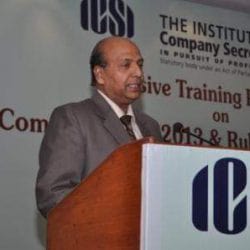 Advocate Pradeep Kumar
Advocate Pradeep Kumar
PK Mittal BCom Delhi university 1975 LLB Delhi University 1978 FCS Fellow Member of ICSI 1992 1982 to 1992 as CS in Corporate Head Legal Apollo Tyres Ltd 1986 to 1992 1993 onwards Advocate in Delhi High Court CESTAT NCLT = Practcising Indirect Tax and Corporate laws 1993 to till date. Written more than 100 Article on Company Law and Corporate laws Indirect Tax Speaker on Indirect Tax Co Law and IBC in various Seminars Workshop organised by ICAI ICSI and ICMA and other organisations Convenor Core Group on GST of ICSI


